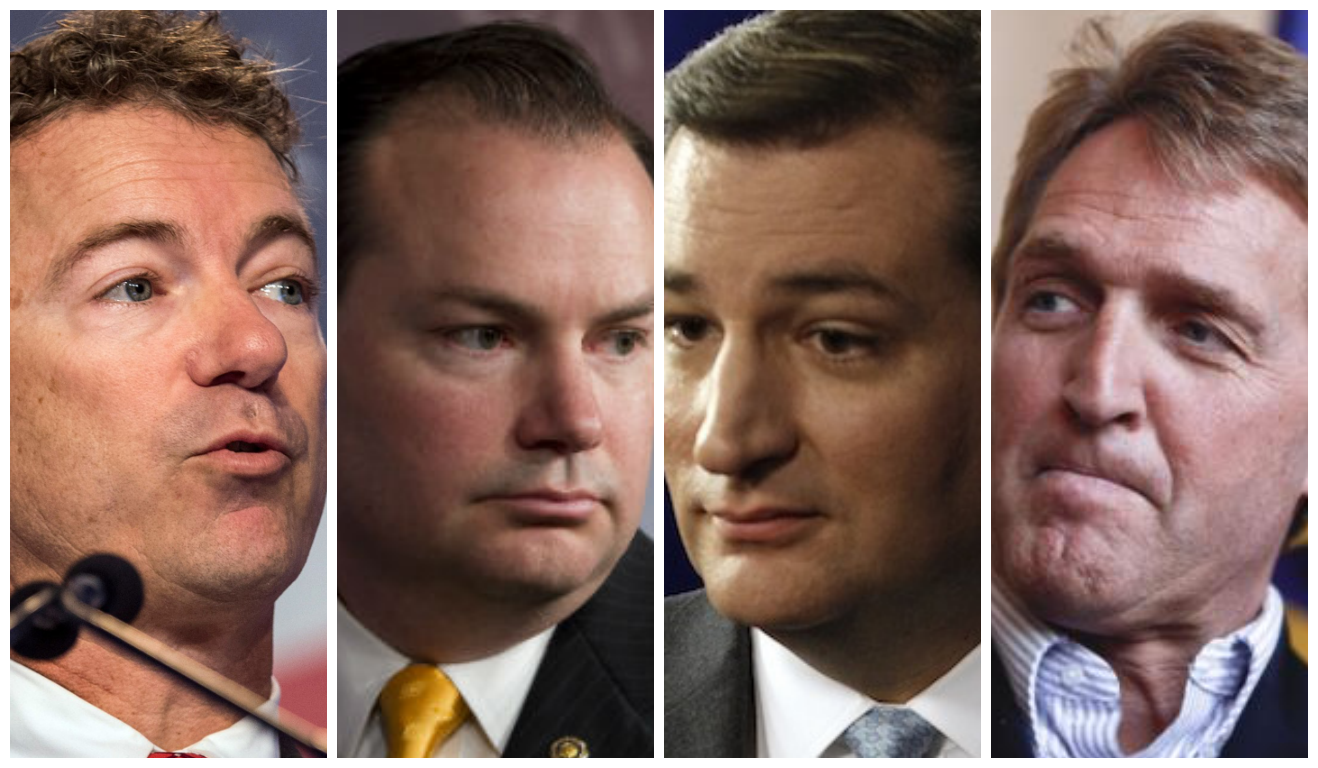In August, Attorney General Eric Holder announced that the Justice Department would seek to curtail mandatory minimum sentencing. Holder said the “war on drugs” created shameful “racial disparities” in sentencing and that “Too many Americans go to too many prisons for far too long, and for no truly good law enforcement reason.”
Videos by Rare
Now, hundreds of prosecuting attorneys have written an open letter to Holder in support of keeping mandatory minimums, claiming they “reach only to the most serious of crimes.”
Four prominent Republicans, including members of the Senate Judiciary Committee, are siding with Holder and against mandatory minimum sentencing: Rand Paul (R-Ky.), Mike Lee (R-Utah), Ted Cruz (R-Texas) and Jeff Flake (R-Ariz.).
Paul, Lee and Cruz are viewed as some of the most popular tea party Republicans. Conservative activist groups FreedomWorks and Club for Growth endorsed Flake in his 2012 election. Some conservatives have expressed disappointment with Flake since.
At Main Justice, a news site dedicated to covering the Justice Department, Jamie Fellner says the pro-mandatory minimum prosecutors are wrong about who is effected by harsh drug sentencing:
The National Association of Assistant United States Attorneys (NAAUSA) has sent a letter to Holder saying mandatory minimums “reach only to the most serious of crimes. They target the most serious criminals. They provide us leverage to secure cooperation from defendants. They help to establish uniformity and consistency in sentencing. And foremost, they protect law-abiding citizens and help to hold crime in check.”
An impressive set of claims — but mostly false.
Mandatory minimums reserved for the most serious criminals? Hardly. According to the United States Sentencing Commission, 93 percent of federal drug defendants come from the lower or middle tiers of the drug business; 40 percent were couriers or street level dealers…. As a former US Attorney told me, “The public simply does not realize how many low-level guys are in [federal] prison…. We lock up the lowest fruit in drug conspiracies.”…
Fellner adds, “What mandatory minimums do — and here we get to the heart of NAAUSA’s opposition –is provide prosecutors with ‘leverage’ to extract guilty pleas and cooperation from defendants. Leverage is a polite word for coercion….”
NPR reported damning new information about mandatory minimum sentencing on Wednesday:
A new report says the Justice Department regularly coerces defendants in federal drug cases to plead guilty by threatening them with steep prison sentences or stacking charges to increase their time behind bars.
And for the first time, the study by Human Rights Watch finds that defendants who take their fate to a judge or jury face prison sentences on average 11 years longer than those who plead guilty.
In all, a whopping 97 percent of defendants plead guilty — no surprise, says author Jamie Fellner, given the enormous and essentially unchecked power that federal prosecutors wield.
“As long as there are mandatory minimums, prosecutors dictate the sentences by the charges they bring,” (Jamie) Fellner told NPR in an interview.
Senators Paul and Lee have both introduced legislation that would end current mandatory minimum sentencing. Paul has been out front on this issue long before the Obama administration began pursuing sentencing reforms, earning the praise of liberals and progressives.
The neoconservative-leaning PowerLine blog, noted disapprovingly of the tea party Republicans, “Let the record show that in the battle between Attorney General Holder and the Association of Assistant U.S. Attorneys over slashing mandatory minimum sentences for serious drug crimes, four Republican members of the Senate Judiciary Committee sided with Holder. The four are Rand Paul, Mike Lee, Ted Cruz, and Jeff Flake.”
PowerLine’s Paul Mirengoff added, “It was predictable that Paul would agree with Holder and the criminal defense bar on this one, and it’s not shocking that the others did.”
Mirengoff concluded, “I find it disheartening that the four would permit what looks like knee-jerk libertarianism to override the strong arguments against Holder’s gift to the drug pushers.”



